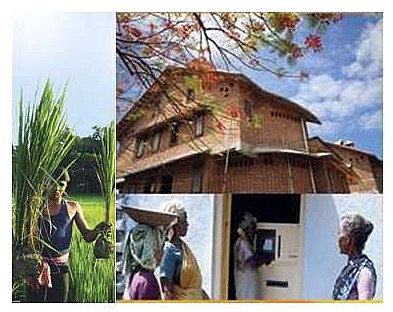This hand book on Indian science and technology was produced at the end of a project entitled “Science, Ethics and Technological Responsibility in Developing and Emerging Countries” (SET DEV) by Knowledge in Civil Society (KICS). The project aimed at:
- Activating processes of building institutional capacities and skills on science,ethics and STR socialization
- Defining and understanding perspectives of socialization of science and technology that take into consideration local needs in a multilateral dialogue.

This document first highlights the methodology of engagement by the SET DEV partners and the processes followed in selecting the case studies. Some of the insights from three of the pilots on the explication of the ideas of the manifesto are described. In the subsequent chapters, the three case studies namely, medical ethics in hysterectomy, sustainable built environment in reconstruction and democratising the water sector are presented.
The document provides some insights on the socialisation of science in India by drawing upon the experiences of the case studies and two focus group discussions and a consultative workshop that were held between Jan – March 2010 at Hyderabad and Bengaluru.
The process for selection of the case studies was initiated with a call for concept notes shared widely with the various civil society organisations who were aware of and/or were a part of the manifesto process. Seven proposals were received of which five were selected after a collaborative meeting, and three have been included in this handbook.
Several workshops and focus group discussions were held to examine the connections between these practices and the knowledge swaraj manifesto. The reports of the focus group discussions and consultative workshops have been synthesised as lessons in Chapter 5.
- The first case study looks specifically at the idea of the violence of the scientific method and its implications for medical ethics. The investigation of the practice of unindicated hysterectomy in rural Andhra Pradesh is a good example of how the easy access to technological systems of diagnosis has led to medical science taking a back seat and the dynamics of the industry determining the path of treatment. The idea of technological responsibility and socialised scientists in action is one of the contributions of the case study to the manifesto.
- The second case study looks more closely on how knowledge is reconstructed at the time of disasters. The construction industry’s ecological foot print is one of the biggest in terms of climate change and the case looks at how people’s choices can be reduced at the times of natural disasters during reconstruction with the built environment.
- The third case study looks specifically at the role of civil society in providing alternatives in science and technology. The case looks at experiments in democratizing the water sector in Andhra Pradesh by showing first how scientific expertise is currently distanced from society leading to ineffective designs and unequal access of water services.
The handbook ends by describing how the vision of the manifesto has been taken to the mainstream science and technology establishment in India through the carefully designed focus group and consultative workshops.
The document argues that these have important policy implications for the way we look at knowledge transfer and how we need to move from a linear model of knowledge transfer of research and development to a more complex, iterative, and dynamic system of innovation that can lead to a more harmonious science and technology policy that is socially embedded and cognisant of the principles of sustainability, justice and plurality.
A copy of the handbook can be downloaded from below:
/articles/piloting-knowledge-swaraj-hand-book-indian-science-and-technology-kics